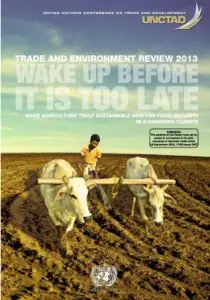Even though United States government continues to push for the use of more chemically-intensive farming methods such as GMOs and monoculture-based crops, the cultivation of GMOs is being banned across the world including in several different European countries.
And while Monsanto and others continue to use their multi-million dollar PR budgets to push the narrative that GMOs are needed to “feed the world,” an oft-overlooked report released in 2013 by the United Nations tells a completely different tale: that small scale organic farming is the key to feeding the world and improving food security for the needy after all.
That was the key point of a publication from the UN Commission on Trade and Development (UNCTAD) titled “Trade and Environment Review 2013: Wake Up Before It’s Too Late,” which included contributions from more than 60 experts around the world.
The cover of the report looks like that of a blockbuster documentary or Hollywood movie, and the dramatic nature of the title cannot be understated: The time is now to switch back to our natural farming roots.
The findings on the report seem to echo those of a December 2010 UN Report in many ways, one that essentially said organic and small-scale farming is the answer for “feeding the world,” not GMOs and monocultures.
According to the new UN report, major changes are needed in our food, agriculture and trade systems, with a shift toward local small-scale farmers and food systems recommended.
Diversity of farms, reducing the use of fertilizer inputs and other changes are desperately needed according to the report, which was highlighted in this article from the Institute for Agriculture and Trade Policy.
It also said that global trade rules should be reformed in order to work toward these ends, which is unfortunately the opposite of what mega-trade deals like the proposed Trans Pacific Partnership (TPP) and the U.S.-EU Trade and Investment Partnership (TTIP) are seeking to accomplish.
The Institute noted that these pending deals are “primarily designed to strengthen the hold of multinational corporate and financial firms on the global economy…” rather than the reflect the urgent need for a shift in agriculture described in the report.
Among the findings of the report are that the following changes are needed:
- Increasing soil carbon content and better integration between crop and livestock production, and increased incorporation of agroforestry and wild vegetation
- Reduction in greenhouse gas emissions of livestock production
- Reduction of GHGs through sustainable peatland, forest and grassland management
- Optimization of organic and inorganic fertilizer use, including through closed nutrient cycles in agriculture
- Reduction of waste throughout the food chains
- Changing dietary patterns toward climate-friendly food consumption
- Reform of the international trade regime for food and agriculture (in other words putting the power back in the hands of the people rather than companies like Monsanto)
The report specifically mentions the promise held by biodynamic farming, an organic system that works with the rhythms of nature and the planet to produce incredible yields without synthetic chemicals.
Food Price Speculating Remains a Major Problem
Even global security may be at stake according to the report, as food prices (and food price speculating) continue to rise.
“This implies a rapid and significant shift from conventional, monoculture-based and high-external-input-dependent industrial production toward mosaics of sustainable, regenerative production systems that also considerably improve the productivity of small-scale farmers,” the report concludes.
While Monsanto and other GMO agribusiness companies continue to say that their products are made to “feed the world,” it’s abundantly clear from this report that economics, access to food, and other issues are the real culprits when it comes to world hunger.
The United States even throws out almost half of its food and other countries have major problems in this area as well.
You can read more about the report from the Institute by visiting their website here.
Thanks for reading! P.S. You can subscribe for more updates by clicking here.
Thanks for installing the Bottom of every post plugin by Corey Salzano. Contact me if you need custom WordPress plugins or website design.












